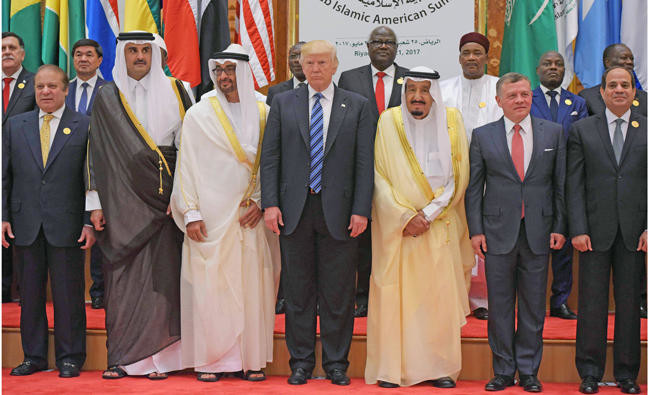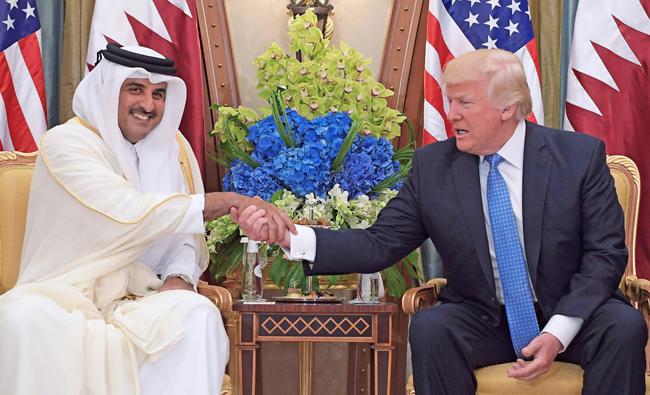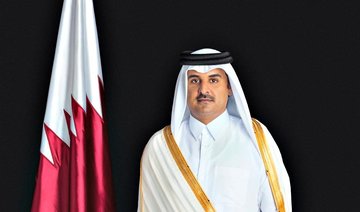JEDDAH: Tensions rose in the Gulf on Tuesday after a series of controversial comments attributed to Qatar’s emir, in a row that led to the blocking of Doha-aligned news websites in some neighboring states.
Sheikh Tamim bin Hamad Al-Thani’s alleged comments, carried by the official state news agency QNA, apparently saw him endorse Iran, Hamas and Hezbollah — strongly diverging from the stance of Qatar’s Gulf neighbors.
Doha claimed the report was the result of a hacking attack — but its Gulf neighbors responded nonetheless, particularly after the same comments were repeated in more than one language, on more than one outlet and at various times of the day in a manner which makes the story true and the hacking seem less likely.
The Arabic-language website and phone application of Al-Jazeera and the Middle East Eye website were blocked in Saudi Arabia and the UAE a day after the Qatari state news agency carried inflammatory comments attributed to Sheikh Tamim. Egypt also blocked some Qatari outlets, Al-Watan reported.
Earlier reports also attributed to the official Qatar News Agency said that Doha has withdrawn its ambassadors from Saudi Arabia, Egypt, Kuwait, Bahrain and the UAE, according to the Al Arabiya News Channel.
Qatar’s Foreign Minister said early Wednesday that he did not make any statement regarding the withdrawal or eviction of five Arab ambassadors from Doha, Al Arabiya reported.
Qatar maintains that the statement posted to QNA was the result of a hack, and says it is being investigated. But the report in question was simultaneously posted in different languages and on social media platforms, where they remained, according to Al Arabiya.
The remarks led to a widespread backlash on social media, while access to some Qatar-sponsored media outlets was restricted elsewhere in the Gulf.
The emir’s alleged comments were in line with recent criticism waged against the UAE, Bahrain and Saudi Arabia by other Qatar-sponsored media outlets such as Al-Jazeera, Al-Arab and the London-based Middle East Eye.
Sheikh Tamim also allegedly spoke of “tensions” with the new US administration and predicted that US President Donald Trump will not last long, citing domestic political problems in Washington over ties with Russia.
Sheikh Tamim also seems to have praised Iran, which even the previous US administration under President Obama labeled as the “biggest state sponsor of terror.”
The emir reportedly said: “There is no wisdom in harboring hostility toward Iran.”
Despite the emir allegedly saying that the relations with Israel are “good,” he went on to describe Hamas — which is designated as a terrorist organization by the US, EU and Israel and is condemned even by Arab countries for firing missiles toward civilians — as the “official representative of Palestinians.”
Despite this apparent endorsement of Hamas, the emir seems to have still refuted allegations of his country supporting terror. Yet many claim Doha supports both Lebanon’s Hezbollah and Egypt’s Muslim Brotherhood, which is designated a terrorist group by some fellow GCC countries.
The emir reportedly also criticized the UAE, Bahrain and Egypt for waging a campaign against Doha. All three countries are fierce critics of the Muslim Brotherhood. However, the emir seems to have not mentioned Saudi Arabia by name.
He did seem, however, to criticize what he described as “exaggerated” arms deals and said that countries should be spending such funds on development projects. That was an apparent attack on the recent enormous Saudi-US arms deals signed in Riyadh during President Trump’s visit.
The emir is said to have credited Al-Udeid Air Base, which houses the biggest US Air Force base in the region, with protecting Doha from some neighboring countries, without mentioning any names.
Whether the comments attributed to the emir are real or not, much of it reflects what was previously being reported by Qatari media outlets attacking Saudi Arabia, the UAE and Bahrain.
In a series of comments posted on his twitter account, Deputy Head of Dubai Police and General Security Dhahi Khalfan expressed his shock over the alleged statements.
In one tweet the Khalfan asked why Qatar would break the line of unity Riyadh has built, while in another he asked why Qatar would extend bridges with Iran.
Addressing Qatari citizens, Khalfan said: “You should not worry about Saudi Arabia, UAE, Bahrain, Kuwait and Egypt, you should be worried about Iran."
“Saudi Arabia succeeded in convincing the world of its stances but Qatar refused to listen,” the Dubai police chief added.
“What does Qatar mean that the US base is there to protect it from its neighbors? Qatari people are dear to their neighbors.”
Hack or attack? Qatari emir's allegedly contrarian 'comments' unsettle neighbors
Hack or attack? Qatari emir's allegedly contrarian 'comments' unsettle neighbors

AlUla’s vision based on strong partnerships, holistic development, says royal commission official

- Ben Hudson highlights pacts with global investors and nations
- Plan includes $31.9bn contribution to Kingdom’s GDP by 2035
DAVOS: Taking a socially and economically responsible approach to development and working closely with committed partners is the key to fulfilling AlUla’s potential.
This is according to the Royal Commission for AlUla’s Chief Development and Construction Officer Ben Hudson, who spoke to Arab News at the World Economic Forum in Davos this week.
Hudson also emphasized the commission’s commitment to cultural preservation in transforming AlUla into a global destination.
Hudson underscored the RCU’s alignment with Saudi Arabia’s Vision 2030 reform program. “(The) RCU is unlocking AlUla’s economic, investment, and touristic potential through comprehensive regeneration, integrated partnerships, and inclusive sustainable development.”
Highlighting the AlUla Sustainability Charter as a blueprint for the organization’s initiatives, he said the RCU was also focused on revitalizing the built environment, community empowerment, and light-touch tourism.
Citing the example of the Dar Tantora The House Hotel, he said this was tangible proof of its plan in action, where the blending of traditional materials with local expertise has created new socio-economic opportunities while preserving the cultural heritage of the area.
Hudson was keen to highlight the RCU’s plans to contribute SR120 billion ($31.9 billion) to Saudi Arabia’s gross domestic product by 2035, driven by sustainable tourism and investment.

In Davos, Hudson said the RCU was looking to foster global partnerships to accelerate AlUla’s regeneration.
“We are building on AlUla’s position as an ancient crossroad of civilizations, transforming AlUla into the world’s largest living museum, and a place for our community to thrive, (and this) can only be achieved when we work together,” he said.
“Our first strategic partnership was established with France, almost at RCU’s inception. Since then, we’ve grown our network, establishing partnerships with China, Italy, the UK, and world-class partners from the US, among others.
“We continue to make progress in evolving our partnership portfolio by working with UNESCO, the International Union for Conservation of Nature, the World Bank, and many others,” he said.
These collaborations enable billions of dollars in private sector investment across hospitality, real estate, cultural conservation, and infrastructure.
Hudson emphasized the importance of co-investment, inviting partners to join in developing key infrastructure, such as power and water, and creating vibrant public spaces. “This gives our partners confidence and provides a platform for sustained engagement, be it with our community or across the business landscape,” he said.
Preserving AlUla’s rich cultural heritage remains central to the RCU’s mission. Hudson described the area as a “hidden gem,” now revealed to the world, with strategies in place to balance conservation with growth.
Collaboration with organizations including the International Council on Monuments and Sites has enabled the creation of Heritage Impact Assessments to protect cultural areas while facilitating new construction, he said.
“Our goals are shaped by community feedback, from the people who stand to benefit the most, whose culture and heritage make AlUla what it is,” he explained.
The RCU’s short-term goals focus on making AlUla a livable destination that embodies the Quality-of-Life Program of Vision 2030, by attracting investment, enhancing infrastructure, and creating opportunities for local and global stakeholders.
Looking to the future, Hudson said the RCU’s commitment was to “creating a destination built around a vibrant culture and ancient heritage —somewhere to live, work, invest, and grow.”
AlUla strengthens global presence with LeBron James, UIM E1 World Championship

- Team AlUla championed by LeBron James will take part in the UIM E1 World Championship presented by PIF
- Title partnership centers around AlUla’s ambition as a premier sports and adventure hub, dedication to supporting high-profile international events
ALULA: AlUla has strengthened its global sporting presence with LeBron James launching a new team in the UIM E1 World Championship presented by the Saudi sovereign wealth fund PIF in the world’s first all-electric race boat championship.
Named after the ancient oasis city in northwestern Saudi Arabia, Team AlUla Championed by LeBron James will compete in the 2025 E1 season, beginning with the E1 Jeddah GP on Jan. 24-25, and will be piloted by talented racers Rusty Wyatt and Catie Munnings.
The partnership centers around AlUla’s ambition as a premier sports and adventure hub, and its dedication to supporting high-profile competitions and sportspeople across the world, a press release issued on Friday said.
Central to AlUla’s development as a destination is the enrichment of its local community — a commitment that closely aligns with LeBron James’ philanthropic efforts in his hometown of Akron, Ohio.
The E1 all-electric race boat series is also in line with AlUla’s commitment to sustainability and comprehensive regeneration, evident in the city’s approach to holistic tourism, which manages visitor numbers, boosts environmental awareness and engages the community in conservation.
Core to its strategy is the AlUla Sustainability Charter, which guarantees the preservation of the natural and historical integrity of the area amid ongoing development.
This commitment is highlighted by initiatives such as designating 50 percent of AlUla as nature reserve and investing in eco-friendly infrastructure.
Rami AlMoallim, vice president of destination management and marketing at the Royal Commission for AlUla, said: “Our partnership with E1 and LeBron James marks a significant moment for AlUla, built on a shared commitment to conservation and community, spanning our desert landscapes to the world’s seas.”
“This collaboration highlights the deep interconnectedness of our environments and the power we all have to make a change. As a champion of regeneration and wildlife conservation, AlUla sees electric boat racing as an opportunity to redefine the future of sports and innovation and we are thrilled to be part of such a visionary partnership,” AlMoallim said.
As a growing heritage luxury boutique destination, and home to Hegra, Saudi Arabia’s first UNESCO World Heritage Site, AlUla has become known for blending history with innovation as it champions world-class home-grown sporting events such as Richard Mille AlUla Desert Polo, AlUla Trail Race, AlUla Tour and more.
Through AlUla’s partnership, Team AlUla Championed by LeBron James will visit iconic host cities such as Doha, Monaco and Miami, reinforcing its status as a premier global destination.
Saudi authorities foil attempt to smuggle $35m worth of captagon pills

RIYADH: The Saudi Zakat, Tax and Customs Authority has thwarted an attempt to smuggle over 1.4 million captagon pills into the Kingdom through the Jeddah Islamic Port.
According to the authority, the pills were found inside a shipment during customs procedures and live detection.
Coordination with the General Directorate of Narcotics Control led to the arrest of the intended recipients of the seized items in the Kingdom.
Captagon, a type of amphetamine, is used predominantly by young men and teenage boys across the Middle East and has a street value of between $10 and $25 a pill, according to research by the International Journal of Addiction Research.
Saudi Arabia to host regular World Economic Forum event in the Kingdom

DAVOS: Saudi Arabia announced a regular world economic global forum in the Kingdom said the country’s minister of economy Faisal Alibrahim in Davos on Friday.
Alibrahim said the decision was based on the success of the forum held for the first time last year.
Saudi Arabia hosted its first two-day WEF special meeting on April 28-29, 2024.
The meeting focused on global collaboration, growth and energy.
At the time of last year’s event Alibrahim said that the forum had recognised that the Kingdom was “becoming a stronger, more impactful leader on the global stage,” and he added: “we found it as an opportune time to bring this global Tier 1 event to the kingdom, and start this new chapter together.”
Saudi Arabia is already the birthplace of the Future Investment Initiative, which holds its annual conference in the Kingdom.
Saudi foreign minister in Damascus to discuss Kingdom’s support for Syrian transition

RIYADH: Saudi Arabia’s Foreign Minister Prince Faisal bin Farhan arrived in Syria on Friday, in an official visit foreign ministry said in a statement.
Prince Faisal will meet with Syria’s de facto leader Ahmed Al-Sharaa and meet with top officials in the new Syrian administration.




















